2020-2021学年牛津译林版八年级英语下册单元重点词组、句型、语法汇总(Units1-8)
- 格式:doc
- 大小:71.00 KB
- 文档页数:10

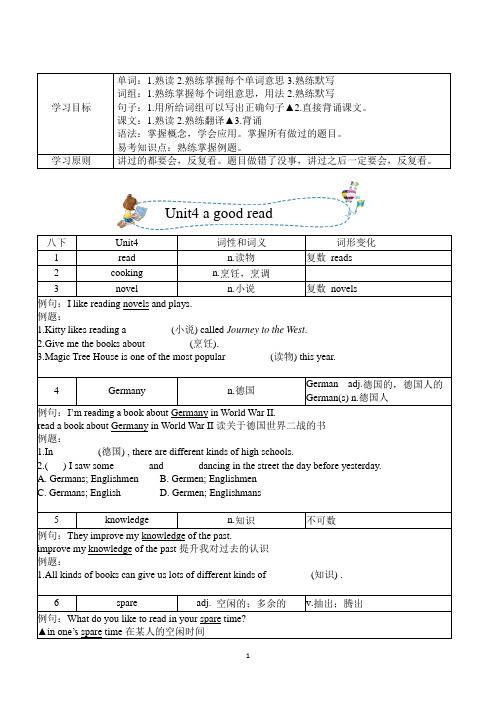
学习目标单词:1.熟读2.熟练掌握每个单词意思3.熟练默写词组:1.熟练掌握每个词组意思,用法2.熟练默写句子:1.用所给词组可以写出正确句子▲2.直接背诵课文。
课文:1.熟读2.熟练翻译▲3.背诵语法:掌握概念,学会应用。
掌握所有做过的题目。
易考知识点:熟练掌握例题。
学习原则讲过的都要会,反复看。
题目做错了没事,讲过之后一定要会,反复看。
Unit4 a good read八下Unit4 词性和词义词形变化1 read n.读物复数reads2 cooking n.烹饪,烹调3 novel n.小说复数novels例句:I like reading novels and plays.例题:1.Kitty likes reading a ________ (小说) called Journey to the West.2.Give me the books about ________ (烹饪).3.Magic Tree House is one of the most popular ________ (读物) this year.4 Germany n.德国German adj.德国的,德国人的German(s) n.德国人例句:I’m reading a book about Germany in World War II.read a book about Germany in World War II读关于德国世界二战的书例题:1.In ________ (德国) , there are different kinds of high schools.2.( ) I saw some ______ and ______ dancing in the street the day before yesterday.A. Germans; EnglishmenB. Germen; EnglishmenC. Germans; EnglishD. Germen; Englishmans5 knowledge n.知识不可数例句:They improve my knowledge of the past.improve my knowledge of the past提升我对过去的认识例题:1.All kinds of books can give us lots of different kinds of ________ (知识) .6 spare adj. 空闲的;多余的v.抽出;腾出例句:What do you like to read in your spare time?▲in one’s spare time在某人的空闲时间A. where to buyB. what to buyC. how to buyD. when to buy▲辨析must和have to➢意义区别▲must与have to两者都表示“必须"但must侧重于说话者的主观看法,认为有必要或有义务去做某事,常跟law, rules等法律法规连用,或是用于标语中,较严谨;【例】Everyone must keep the law. 人人都要守法。

牛津初中英语8B unit1—unit8 知识点归纳8B Unit1【考点精讲】一、核心词汇1.past n.[考点点拨]past作名词,意为“过去”,其还可作介词和形容词,可用于如下情况:in the past(n.)在过去;half past(prep.)five 5点半;in the past(adj.)three years在过去的3年里。
如:When he walks past our desks, he always knocks ourbooks and pens off the desks.当他走过我们课桌的时候,他总是把我们的书本和钢笔从课桌上碰掉下来。
The boy finished his homework with the help of his father in the past.这个男孩过去是在他父亲的帮助下完成作业的。
2.present n.[考点点拨]present作名词,意为“现在,目前”。
At present=at the moment=right now 目前;其还可作形容词,your present job你目前的工作;present用作名词,还可表示“礼物”,a birthday present -份生日礼物。
如:He is washing his clothes at present.现在他正在洗衣服。
3.northern adj。
[考点点拨] 方位词:north-northern; west-western; south-southern; east-eastern。
如:in the north of China = in the northern part of China在中国北部East China华东;North China华北The northern part of the city used to be sparsely populated, but has now become acultural centre.城北过去人口稀少,但现在成了文化中心。

牛津译林版八年级下册英语各单元语法知识点复习提纲Unit1 Past and present一、同步知识梳理知识点1:past and present(P6)(1)pastn. 过去,以前;in the past 在过去adj. 过去的,以前的;in the past few years 在过去的几年里prep. 经过walk past the post office走过邮局【例句】In the past, there was no underground in Nanjing.Let’s not make the past mistakes.When I walk past the post office, I see a bird flying over the tree.(2)presentadj.现在的; 目前的; 出席的n.现在; 礼物; at present 现在;a present for you=a gift for you给你的礼物vt.介绍; 出现; 提出; 赠送;【例句】Everyone can be present ed a present at present.知识点2:You’ve changed, Eddie. You used to share food with me.(P6) 你变了。
你以前跟我分享食物的。
(1)change: vt./vi. 改变,变更; change into变成n.变化,改变; change(s) to ...的变化【例句】Great changes to Nanjing have taken place.(2)use n.用途; 使用能力; 运用头脑(或身体)的能力;vt.用,使用; 行使,【常用短语】①used to (do sth.) “过去常常(做某事)”批注:否定形式:didn’t use to / usedn’t to①get/be used to(doing sth. )“习惯于(做某事)【例句】He used to go fishing every Saturday. But since he changed his job, he’s barely(几乎不) had a chance. He thinks he’ll never be used to this busy lifestyle.【拓展】useful adj. 有用的;useless adj. 无用的知识点3:I first lived in the northern part of the town with my parents.(P8)【例句】Beijing is in the northern part of China.批注:注意in the north与in the northern part of 的同义句转换。

8B unit2词组和重要句子1.去南山度假go to South hill for my holiday2.我在整理所有物品I am getting all my things3.我认为对我来说它将不是一个假期I don’t think it will be a h oliday for me .4.名胜地places of interest = interesting places5.。
的首都the capital of6.它有什么特别的What’s special about it?7.我们从上周起就没有见过对方了We haven’t seen each other since last week.8.十分想念你miss you so much9.玩得极其开心have a fantastic / good time10.今天我们在迪斯尼度过一整天Today we spend the whole day at Disneyland.11.乘地铁去公园go to the park by underground= take the unde rground to the park12.一个在黑暗中的室内过山车an indoor roller coaster in the dark13.它以高速行驶It moved at high speed14.我们在行程中尖叫和大笑We were screaming and laughing through the ride15.匆忙去某地hurry to…… = go to…… in a hurry16.快速用餐have a quick meal17.我们见到一些卡通人物,例如白雪公主。
We met some cartoon characters,such as.18.迪斯尼人物的游行a parade of Disney characters19.傍晚时分later in the afterno on20.那是一天最好的部分It was the best part of the day.21.我跟着它们跑,忍不住不停的拍照I ran after them and couldn’t stop taking photos.22.像魔术一样be like magic23.闻到苹果派的味道.感觉到风smell the apple pie and feel the wind24.几个钥匙扣 a couple of key rings25.在这天结束的时候at the end of the day26.观看烟花watch the fireworks27.在你呆在那儿期间during your stay there28.让我看一下Let me have a look29.在烟花下看上去是明亮和美丽的look bright and beautiful under the fireworks30.看到安迪在玩沙see Andy playing in the sand31.回来,返回be/come back = return32.从。

牛津译林版八年级英语下册各单元知识点归纳8B Unit 1 短语和重点句型1. repair over/ more than ten bicycles2. teach us a lot about the history of China3. the changes in Beijing4. during/in/over the past century5. learn more about Beijing’s past and present6. hear about/o f…hear from sb.= receive/ get one’s letter=receive/get a letter from sb.7. living conditions8. return sth. to sb.9. make communication much easier10. go/travel/study abroad11. at primary school12. keep in touch with each other13. communicate with sb.14. take place15. Many changes have taken place in my hometown. 16. travel to and from the town by bus, taxi or train17. green hills all around18. a river runs through the centre of town19. get used to the changes of lifeget/be used to sth./ doing sth.20. many of Mr Chen’s friends21. on one’s own = by oneself = alone22. throw rubbishrubbish everywhere23. enjoy a comfortable life24. in some large open spaces25. move into new flats26. in their free time27. travel around the town28. on both sides of the street = on each side of thestreet29. have their own cars= have cars of their own修理超过10辆自行车教我们很多有关中国的历史北京的变化在过去一个多世纪里对北京的过去和现在了解更多听说收到某人来信居住条件把某物归还给某人使交流更方便,使得联系更容易去国外在小学互相保持联系和某人保持联系发生(有目的有计划的)(happen偶然发生) 我的家发生了许多变化。
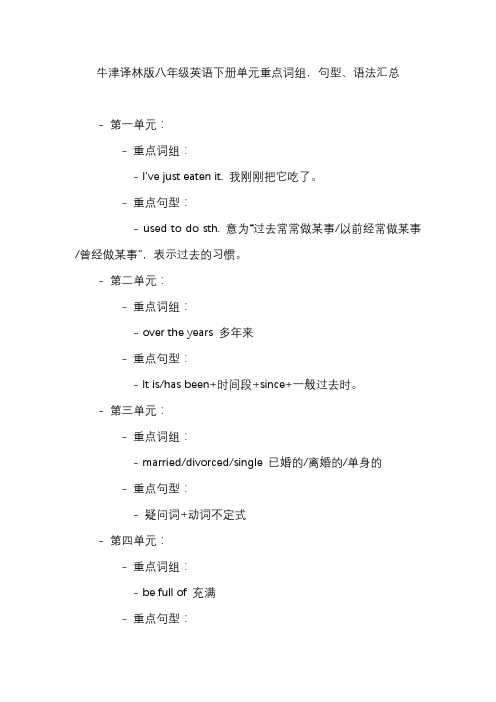
牛津译林版八年级英语下册单元重点词组,句型、语法汇总
- 第一单元:
- 重点词组:
- I've just eaten it. 我刚刚把它吃了。
- 重点句型:
- used to do sth. 意为“过去常常做某事/以前经常做某事/曾经做某事”,表示过去的习惯。
- 第二单元:
- 重点词组:
- over the years 多年来
- 重点句型:
- It is/has been+时间段+since+一般过去时。
- 第三单元:
- 重点词组:
- married/divorced/single 已婚的/离婚的/单身的
- 重点句型:
- 疑问词+动词不定式
- 第四单元:
- 重点词组:
- be full of 充满
- 重点句型:
- so that 以便,为了
- 第五单元:
- 重点词组:
- as a result 结果
- 重点句型:
- 现在完成时
- 第六单元:
- 重点词组:
- interview sb. about sth. 就某事采访某人- 重点句型:
- It is+形容词+to do sth.
- 第七单元:
- 重点词组:
- return to sp. 回到某地
- 重点句型:
- 现在完成时
- 第八单元:
- 重点词组:
- primary school 小学
- 重点句型:
- 祈使句。

Unit 4 A good read【考点精讲】一、核心词汇1.Germany n.[考点点拨] Germany名词,意为“德国”。
German作形容词,意为“德国(人)的”,作名词,意为“德国人”。
常见的国家名称和某国人的单复数形式:国家名称某国人单数某国人复数Germany German GermansAmerica American AmericansAustralia Australian AustraliansCanada Canadian CanadiansFrance Frenchman FrenchmenFrenchwoman FrenchwomenEngland Englishman EnglishmenEnglishwoman EnglishwomenChina Chinese ChineseJapan Japanese Japanese法国人、英国人复数形式是将a改为e,而德国人复数形式并不是将a改为e,中国人、日本人单复数形式相同。
2.stomach n.[考点点拨]s tomach意为“腹部,胃”,虽然是以ch结尾,但是由于“ch”是发/k/音,所以其复数形式是在词尾直接加“-s”。
如:The stomachs of starving people often distend.饥民的腹部常鼓得大大的。
3.either adv.[考点点拨] either意为“也”,用于否定句,且要放在句末。
如:Millie can't skate. I can, t either.米莉不会滑冰,我也不会。
too作“也”讲时,用于肯定句末尾,或作为插入语放在句中,前后用逗号隔开。
如:Tom can swim. I can swim too.汤姆会游泳,我也会。
You,too,may have a try.=You may have a try too.你也可以试一试。
also在书面语中比too更为正式,用于肯定句中。
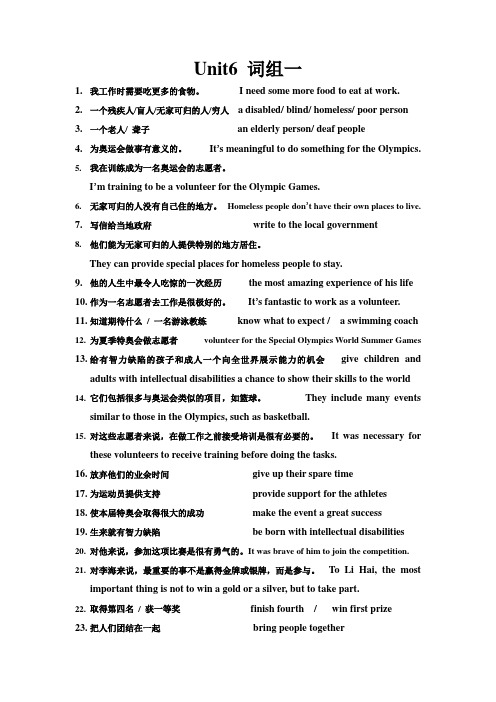
Unit6 词组一1.我工作时需要吃更多的食物。
I need some more food to eat at work.2.一个残疾人/盲人/无家可归的人/穷人 a disabled/ blind/ homeless/ poor person3.一个老人/ 聋子an elderly person/ deaf people4.为奥运会做事有意义的。
It’s meaningful to do something for the Olympics.5.我在训练成为一名奥运会的志愿者。
I’m training to be a volunteer for the Olympic Games.6.无家可归的人没有自己住的地方。
Homeless people don’t have their own places to live.7.写信给当地政府write to the local government8.他们能为无家可归的人提供特别的地方居住。
They can provide special places for homeless people to stay.9.他的人生中最令人吃惊的一次经历the most amazing experience of his life10.作为一名志愿者去工作是很极好的。
It’s fantastic to work as a volunteer.11.知道期待什么/ 一名游泳教练know what to expect / a swimming coach12.为夏季特奥会做志愿者volunteer for the Special Olympics World Summer Games13.给有智力缺陷的孩子和成人一个向全世界展示能力的机会give children andadults with intellectual disabilities a chance to show their skills to the world 14.它们包括很多与奥运会类似的项目,如篮球。
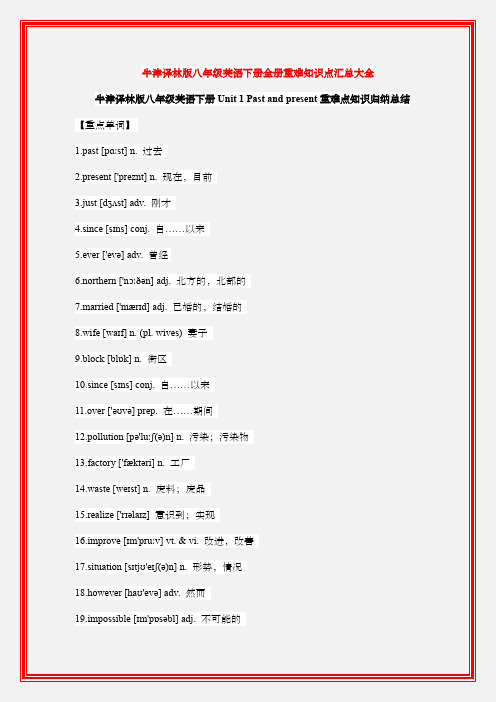
牛津译林版八年级英语下册全册重难知识点汇总大全牛津译林版八年级英语下册Unit 1 Past and present重难点知识归纳总结【重点单词】1.past [pɑːst] n. 过去2.present ['preznt] n. 现在,目前3.just [dʒʌst] adv. 刚才4.since [sɪns] conj. 自……以来5.ever ['evə] adv. 曾经6.northern ['nɔːðən] adj. 北方的,北部的7.married ['mærɪd] adj. 已婚的,结婚的8.wife [waɪf] n. (pl. wives) 妻子9.block [blɒk] n. 街区10.since [sɪns] conj. 自……以来11.over ['əʊvə] prep. 在……期间12.pollution [pə'luːʃ(ə)n] n. 污染;污染物13.factory ['fæktəri] n. 工厂14.waste [weɪst] n. 废料;废品15.realize ['rɪəlaɪz] 意识到;实现16.improve [ɪm'pruːv] vt. & vi. 改进,改善17.situation [sɪtjʊ'eɪʃ(ə)n] n. 形势,情况18.however [haʊ'evə] adv. 然而19.impossible [ɪm'pɒsəbl] adj. 不可能的20.before [bɪ'fɔː] adv. 以前,过去,已经21.lonely ['ləʊnli] adj. 孤独的,寂寞的22.anyway ['enɪweɪ] adv. 尽管,即使这样23.husband ['hʌzbənd] n. 丈夫24.interview ['ɪntəvjuː] n. 采访;会见25.yet [jet] adv. 还,仍26.recently ['riːsntli] adv. 近来,最近27.past [pɑːst] n. 过去28.environment [ɪn'vaɪrənmənt] n. 环境29.transport [træns'pɔːt] n. 交通车辆,运输工具30.condition [kən'dɪʃ(ə)n] n. 环境,条件,状况31.return [rɪ'tɜːn] vi. 返回st [lɑːst] adv. 最近,上一次;最后33.abroad [ə'brɔːd] adv. 到(在)国外34.primary ['praɪməri] adj. 小学教育的;初级的municate [kə'mjuːnɪkeɪt] vi.& vt. 交流,交际munication [kəmjuːnɪ'keɪʃ(ə)n] n. 交流,交际37.exactly [ɪg'zæktli] adv.(答语)正是,没错38.narrow ['nærəʊ] adj. 狭窄的【重点短語】ed to (用于过去持续或经常发生的事)曾经2.turn ... into ... 把……变成……3.from time to time 不时,有时,偶尔4.in some ways 在某种程度上5.all one’s life 一生6.keep in touch 保持联系7.be/get used to 习惯于,适应于8.open space 开阔的空地9.in the north of town在镇子的北边10.get married 结婚11.move two blocks away 搬到两个街区外12.since then 自从那时13.change a lot 变化很大14.over the years 在这几年里15.put the waste into the river 把废料倒进河里16.realize the problem 意识到这个问题17.improve the situation 改善现状18.much cleaner 更干净了19.as often as before 和之前一样频繁20.feel a bit lonely 感觉有点孤独21.travel to and from the town 往返城镇22.go abroad出国23.narrow and dirty roads 狭小肮脏的街道24.enjoy a comfortable life 享受舒适的生活【重点句型】1.You’ve changed too. You used to be so kind to me.你也变了。
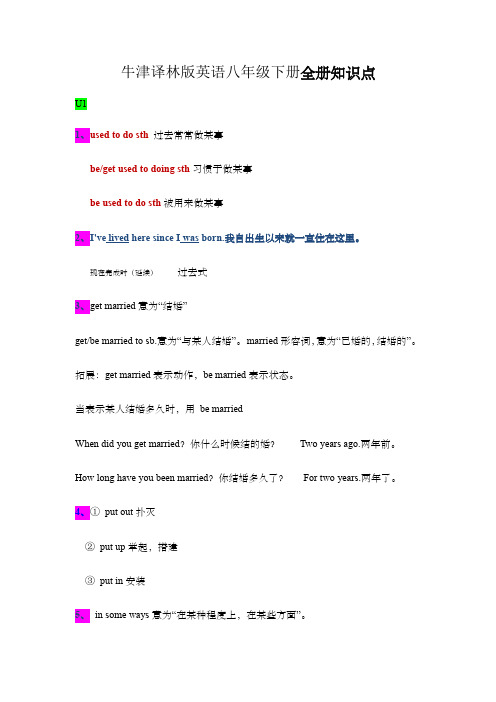
牛津译林版英语八年级下册全册知识点U11、used to do sth 过去常常做某事be/get used to doing sth习惯于做某事be used to do sth被用来做某事2、I've lived here since I was born.我自出生以来就一直住在这里。
现在完成时(延续)过去式3、get married意为“结婚”get/be married to sb.意为“与某人结婚”。
married形容词,意为“已婚的,结婚的”。
拓展:get married表示动作,be married表示状态。
当表示某人结婚多久时,用be marriedWhen did you get married?你什么时候结的婚?Two years ago.两年前。
How long have you been married?你结婚多久了?For two years.两年了。
4、①put out扑灭②put up举起,搭建③put in安装5、in some ways意为“在某种程度上,在某些方面”。
by the way顺便说一下lose one's way迷路in one's way挡住某人的路on one's way to在某人去……的路上6、on one's own意为“独自;独立”,通常在句中作状语,相当于by oneself或alone 1.现在完成时的用法(跟过去和现在都有关联)(1)表示过去发生或完成的动作对现在造成影响,也就是说该动作和现在有联系。
(2)表示从过去某一时间开始一直持续到现在(包括“现在”)的动作或状态,可以和表示一段时间的状语连用,谓语动词多用延续性动词。
(3)表示到现在为止多次发生的动作。
2.现在完成时的标志词现在完成时的标志词有already,yet,ever,recently,just,before(用于句末),so far,for+时间段,since+过去的时间或一般过去时的句子。

U1-4语言点回顾1.present n.现在___________ 目前他现在很忙,不能跟你通话。
v. ①赠送,颁发present sb. ______ sth. / present sth_____ sb.他送给他许多美丽的花。
/2.①used to (do sth.) “过去常常(做某事)” 否定:didn’t use to我们过去周末常常待在家里。
否定疑问②get/be used to sth / doing sth. 习惯于(做某事)我习惯晚上十点之后睡觉。
③be used to do sth./for doing sth. 被用来做某事钢笔是用来写的。
_______ adj. 有用的;_______ adj. 无用的3.in the north of China=in the__________part of China4.married. adj. 结婚的,已婚的我和Alice 在1996年结婚的。
5.on one’s way to 顺便说/问一句by the way 挡路in some ways 在某人去……的路上in the way 在某种程度上6.lonely adj. 孤独的,寂寞的,偏僻的alone adj. adv 独自地我一个人住在偏僻的小镇上,但是我并不感到孤独。
____________________7.改善糟糕的形势_________________8.from time to time=____________=at __________municate vi. & vt. 交流;传达→ ____________ n. 交流;交际10.pollution n. 污染;污染物→ ____________ vt. 污染11. __________the__________ 意识到问题_______ _______ 从那以后____________ sth. ____________ sb.和….分享…_______ _______ 搬走_______ _______ _______ 我的一生hear ____________ 听说hear ____________ sb. 收到某人来信=get a letter from sb.______ ______ 发生(有目的有计划的)、举行____________ 发生(偶然发生)on one’s ____________ = by ____________ = ____________ 独自10.写出下列动词的过去式和过去分词。
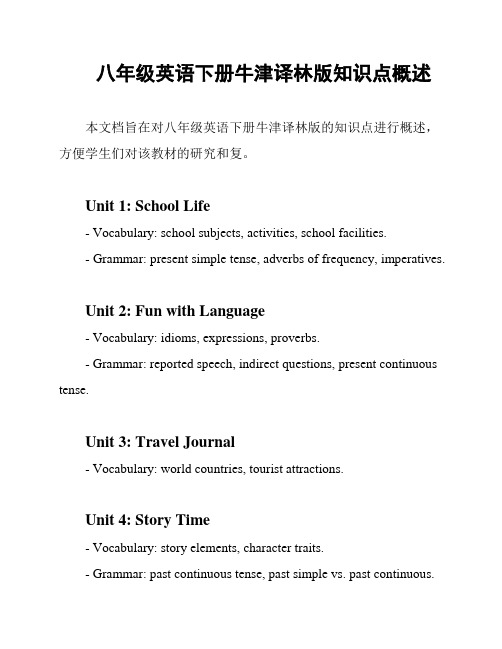
八年级英语下册牛津译林版知识点概述本文档旨在对八年级英语下册牛津译林版的知识点进行概述,方便学生们对该教材的研究和复。
Unit 1: School Life- Vocabulary: school subjects, activities, school facilities.- Grammar: present simple tense, adverbs of frequency, imperatives.Unit 2: Fun with Language- Vocabulary: idioms, expressions, proverbs.- Grammar: reported speech, indirect questions, present continuous tense.Unit 3: Travel Journal- Vocabulary: world countries, tourist attractions.Unit 4: Story Time- Vocabulary: story elements, character traits.- Grammar: past continuous tense, past simple vs. past continuous.Unit 5: Looking Good, Feeling Good- Vocabulary: clothing, personal appearance, health issues.- Grammar: be going to, be supposed to, present continuous for future.Unit 6: Future Jobs- Vocabulary: professions, job skills, job interviews.- Grammar: future simple tense, future time clauses.Unit 7: Finding Solutions- Vocabulary: environmental problems, solutions, recycling.- Grammar: modals of possibility, advice, and deduction, passive voice.Unit 8: All in a Day's Work- Vocabulary: jobs and responsibilities, workplace safety.- Grammar: present perfect tense, present perfect vs. past simple.以上是八年级英语下册牛津译林版的知识点概述。
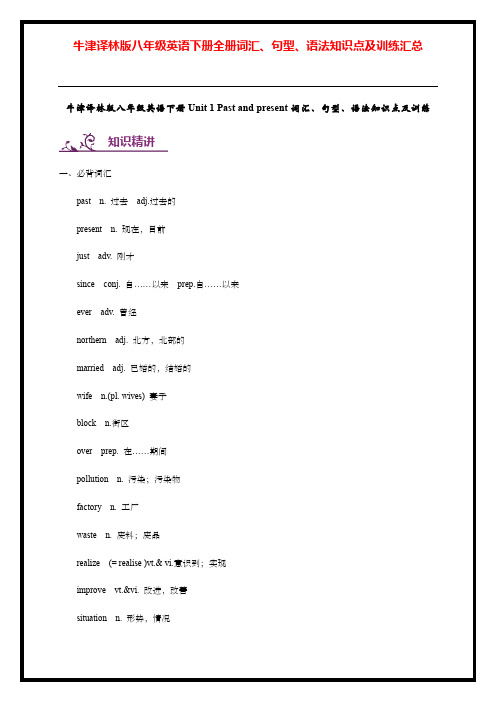
牛津译林版八年级英语下册Unit 1 Past and present词汇、句型、语法知识点及训练知识精讲一、必背词汇past n. 过去adj.过去的present n. 现在,目前just adv. 刚才since conj. 自……以来prep.自……以来ever adv. 曾经northern adj. 北方,北部的married adj. 已婚的,结婚的wife n.(pl. wives) 妻子block n.街区over prep. 在……期间pollution n. 污染;污染物factory n. 工厂waste n. 废料;废品realize (= realise )vt.& vi.意识到;实现improve vt.&vi. 改进,改善situation n. 形势,情况impossible adj. 不可能的before adv.以前,过去lonely adj. 孤独的,寂寞的anyway adv. 尽管,即使这样husband n. 丈夫interview n. 采访;会见yet adv. 还,仍recently adv.近来,最近environment n. 环境transport n.交通车辆,运输工具condition n. 环境,条件,状况return vi. 返回last adv.最近,上一次;最后abroad adv. 到(在)国外primary adj. 小学教育的;初级的communicate vt. &vi. 交流,交际exactly adv.(答语)正是,没错narrow adj. 狭窄的二、重点词汇1. present noun /ˈprez.ənt/1). something that you are given, without asking for it, on a special occasion, especially to showfriendship, or to say thank you(尤指表示友谊或致谢的)礼物,赠品例句:They gave me theatre tickets as a present.他们送给我戏票作为礼物。

牛津译林版八年级英语下册知识点详解汇总unit5知识点1. pick v. 采摘pick flowers in the parkeg. She watched TV until/till her mother came back. 她一直在看电视,直到她母亲回来。
(看电视的动作延续到母亲回来才结束。
)She did n't watch TV until/till her mother came back. 直到她母亲回来她才(开始)看电视。
(看电视的动作直到她母亲回来才发生。
)Until I finished my homework, Mother didn't let me out.3. express v. 表达expression n. 表达①beyond expression 无法形容②express oneself 表明态度eg. He didn’t express himself clearly.例题:( )1. Millie was just going to tell the truth when Tom _______ her.A cut B.cut in C. cut in on D. cut into( )2. Why do you keep the door_______ ?A closeB closedC closing D. closes( )3. Can I go along with you? I won't get_______.A.by the way B on the way C.in the way D to the way( )4.The summer holidays are coming, so the twins as well as Jack_______ to Hong Kong for vacation.A.is going B are going C.goes D. go二、unit61. train意为“培训,接受训练”。
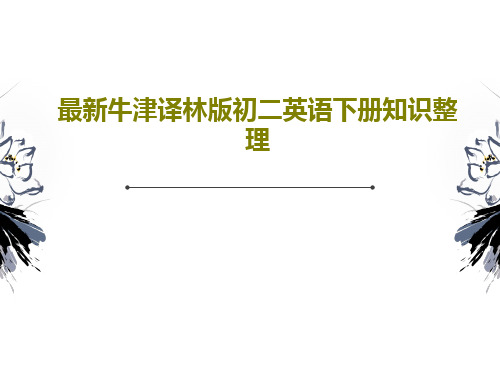
牛津译林版八年级英语下册单元重点词组、句型、语法汇总Unit 1 Past and present重点词组:used to do sth.过去常常做某事move house 搬家in the northern part of town 在小镇北部get/be married 结婚two blocks away 两个街区以外turn...into...把·····变成··..·..·put the waste into the river 向河里排放废物take action to do sth. 采取行动做某事improve the situation 改善这种情况in some ways 在某种程度上as often as before 像以前那样经常play cards and Chinese chess 打牌和下象棋feel a bit lonely 感觉有点孤独from time to time 不时,有时,偶尔take place 发生all one's life一生in the past 过去over the past century 在过去的一个世纪里living conditions 生活条件travel to and from...往返......return from...从......返回go abroad 出国at primary school 上小学时keep/stay in touch 保持联系communicate by email 通过电子邮件交流make sth. much easier 使某事容易/便捷得多get used to (doing)sth. 习惯于(做)某事on one's own 独自;独立enjoy a comfortable life 享受舒适的生活open space 开阔的空地重点句型:1.-Eddie, have you seen my food?埃迪,你看见我的食物了吗?-Yes. I've just eaten it.看见了。
我刚刚吃掉了。
2.You used to share food with me!你过去都和我分享食物的!3.It took a long time to wait for the next one. 等下一辆(公交车)要很长一段时间。
4. Do you know Sunshine Town very well, Mr.Chen?陈先生,您很了解阳光镇吗?5.I've lived here since I was born.自出生起,我就住在这儿了。
6. Have you ever moved house?你曾经搬过家吗?7. When I got married in 1965, my wife and I moved two blocks away and we've lived in this area since then.当我1965年结婚时,我和妻子搬到两个街区以外,此后一直住在这儿。
8. Has the town changed a lot over the years?这些年小镇变化大吗?9. It has become impossible for us to see each other as often as before.对我们来说,像以前一样经常见面已经变得不可能了。
10. Anyway, it's good to see the amazing changes in the town.不管怎样,能看到小镇这些令人赞叹的变化,还是不错的。
11. She's just returned from the USA.她刚从美国回来。
12.When did you last see each other?你们上次见面是什么时候?13. We haven't seen each other since then.此后我们一直没见面。
14.The streets are wide and clean, with many green trees on both sides.街道宽敞干净,两边栽种着许多绿树。
重点语法:现在完成时:1.意义:①表示发生在过去某一时刻并持续到现在的动作或状态;②表示过去已经发生或完成,且对现在有一定影响的动作。
2.基本结构为“助动词have/has+动词的过去分词”。
3.常用时间状语:already、never、ever、yet、just、recently、“for+时间段”、“since+时间点”以及so far、during/over the last/past few days/months/years等。
Unit 2 Travelling重点词组:have a fantastic time 玩得开心极了an indoor roller coaster一个室内过山车at high speed 以高速through the ride 整个乘坐过程中such as 例如later in the afternoon 下午晚些时候run after 追逐,追赶can't stop doing 忍不住一直做某事watch a 4-D film 观看一部4D电影a couple of key rings一对/几个钥匙环at the end of the day 在这天结束时look bright and beautiful 看起来明亮美丽play on the sand 在沙滩上玩places of natural beauty 自然景色优美的地方seaside cities 沿海城市a theme park一个主题公园all year round 终年on cold and snowy days 在寒冷下雪的日子on business 出差take a direct flight to...乘直达航班到··..... fly to 乘飞机到;飞往during the winter holiday 在寒假期间go fishing by the lake 在湖边钓鱼main points 要点places of interest 景点delicious seafood 美味的海鲜leave for 动身去(某处)three and a half hours 三个半小时重点句型:1. I don't think it'll be a holiday for us.我想对我们而言这不会是什么假期了。
2. I ran after them and couldn't stop taking photos. 我追随着他们,忍不住一直拍照片。
3. Hope you've enjoyed yourselfthere!希望你在那儿玩得开心!4.The parade has been over for hours. 庆祝游行已经结束好几个小时了。
5.They have been married for 15 years.他们已经结婚15年了。
6.The fish have been dead for some time.这些鱼已经死了一段时间了。
7.She can go there in any season except winter.除了冬天,她可以在任何季节去那里。
8. The views there in winter may be wonderful, but it is dangerous to climb the mountains or hills on cold and snowy days.那儿冬天的景色可能很美,但在寒冷下雪的日子爬山却是危险的。
9. The best time to go there is in spring or summer.去那儿的最佳时节是春天或夏天。
10. My parents and I left for the airport in the early morning.我和我父母一大早就动身去机场了。
11. It took us about three and a half hours to fly to Hong Kong.我们飞到香港大约花了三个半小时。
重点语法:1.have/has been 和have/has gone的用法①have/has been表示某人曾经去过某地,并且已经回来。
如:My cousin has been to Xi'an twice.我表弟去过西安两次。
② have/has gone 表示某人去了某地,现在还没有回来。
如:I know you've gone to Hainan.我知道你去海南了。
2.与for、since连用的动词现在完成时态的句子中,常出现“for+时间段”或“since+时间点”表示一段时间的时间状语。
它意味着动作从过去某一时刻延续到现在,所以句中动词须为延续性动词,如have、live、fly 等。
短暂性动词须转换为延续性动词,才能与for或since连用。
注:短暂性动词完成时态的肯定形式不能与for或since连用,但否定形式可以,这是因为其否定形式可以表示一个否定的状态,这个状态是可以持续的。
如:I have received his letter for two weeks.(x,因为receive是短暂性动词)I haven't received his letter for two weeks.(V,表示有两周没收到信的状态)Unit 3 Online tours重点词组:look like 看起来像do word processing做文字处理search for information 搜索信息send and receive emails 收发电子邮件watch videos 看视频at the top of 在·····的顶部a trade centre一个贸易中心at the southern end of....在·····的南端after a hard day's work 辛苦工作一天后be famous for 因为·······而出名at the bottom of 在······的底部so much for sth.·······到此为止welcome the new year 迎接新年到来local food 当地食物,地方食品dream of/about 梦想;想象realize one's dream 实现某人的梦想take an online tour 进行一次在线旅行be the opposite of 与·······相反my pleasure不客气,很乐意效劳ask the way 问路book tickets and hotels 预订票和酒店daily English每日英语,日常英语order meals 点餐in daily communication 在日常交流中be made up of由··.··组成prepare for 为·······做准备around the world in eight hours 八小时环游世界since the early twentieth century 自20世纪早期以来on the north-east coast of...在·····东北海岸take sb. on an online tour to...带某人在线游览·····重点句型:1. What do you usually use the computer for?你通常用电脑做什么?2.-How often do you use your computer for this? 你多长时间用一次电脑做这件事?-Almost every day.几乎每天。